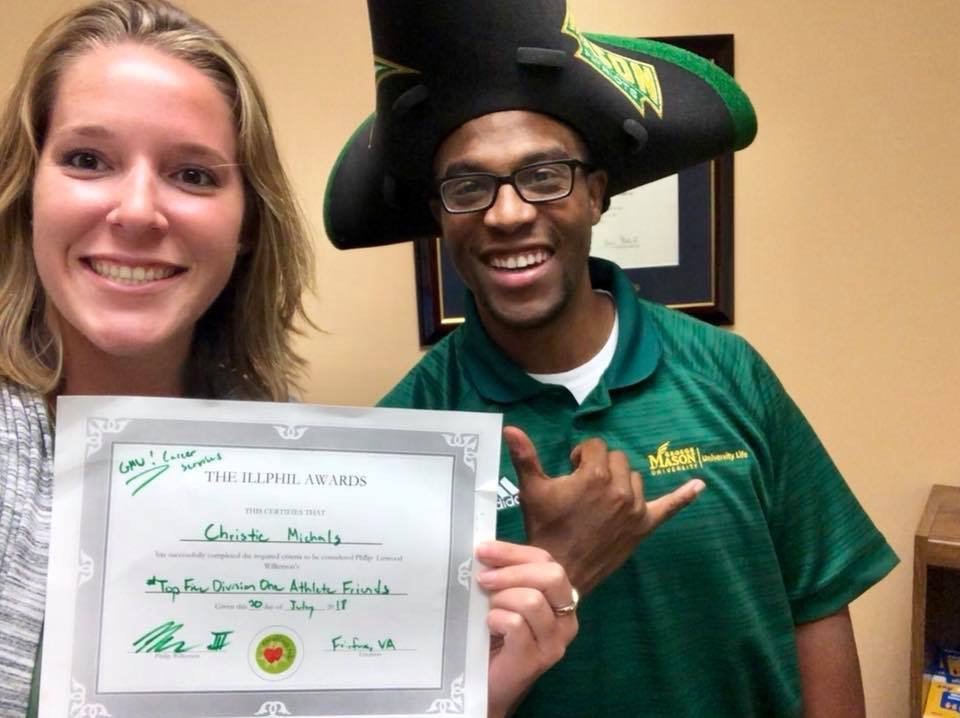Christie Michals and Philip Wilkerson
by Whitney Hopler, Communications Manager
University Career Services employees Philip Wilkerson and Christie Michals are spreading well-being at Mason through their #TeamPositivity movement. Wilkerson (Manager, Industry Advising and Employer Development) and Michals (Employer Relations Coordinator) encourage people to develop habits of intentionally choosing positive words and actions. Making that choice regularly can strengthen both personal and community well-being.
“Positivity gives you a well-being toolkit for problem solving, for hope, for purpose, and to look for opportunities,” Wilkerson said. “It rewires your brain to see possibilities in any situation. Positivity also gives you a shield against negative circumstances bringing you down. If you could train yourself to have a positive attitude, you can respond to negative situations with strength and learn from them.”
At University Career Services, Wilkerson and Michals look for opportunities to celebrate positivity every day — from pointing out coworkers’ strengths at meetings, to listening with care when someone is feeling down or needs help solving a problem. They said they’re grateful for the support of their supervisors Saskia Clay-Rooks, Trasi Watson, and Victoria Suarez to come up with new ideas in their quest to encourage others.
“When you approach each day in a positive manner, this allows you to focus on the things that are in your control,” said Michals. “The attitude or energy you present to other people is a choice you make. Positivity is a skill that requires practice and the intentional decision to have a lens that sees the good in a situation, not the bad. This is so important in the world today. Through our fast-paced environments, it is easy to be distracted or allow outside forces to impact your attitude. Instead of being an energy vampire, which is someone who negatively brings other people down, I choose to be a positive force. I want to be someone who lifts the people around me, to help make their days better or more enjoyable.”
Positivity is like “a mind muscle” Wilkerson said, since it takes commitment and effort to strengthen the habit of making positive choices. As people intentionally choose positivity, they can transform every dimension of their well-being for the better. “Optimism has a profound effect on your well-being. We are big proponents of positivity and the actual science of happiness. … It’s not just sunshine and rainbows; it’s an actual science,” explained Wilkerson.
Just as focusing on positivity can lead to well-being, focusing on regular well-being practices can promote positivity. Wilkerson’s favorite well-being practices include learning (such as reading books and listening to podcasts), praying, and writing in a journal at the start and end of each day. Michal’s favorite well-being practices include spending time with friends, playing basketball, and decluttering her mind and the spaces she spends time in like her office, car, and home.
Both have discussed the connections between well-being and positivity on a weekly podcast that Wilkerson produces called Positive Philter. They’ve taken listeners’ questions about a wide range of topics on the podcast.
One topic that many people are concerned about is mental health. “One of the biggest things for mental health is seeking help,” Wilkerson pointed out. “… Don’t try to do it alone, and don’t feel that by seeking help, you’re weak. There’s no weakness in admitting mental health depression and anxiety. Actually, I would say quite the opposite. There’s a lot of strength in admitting that you need help. … It takes a lot of strength to admit to others that you are feeling down or feeling depressed.”
Michals advised, “If you realize that your mental health or state of mind is beyond your control, and you’re able to realize that you can’t get out of it by yourself, definitely seek help. Speaking with a licensed professional can really help. … They’ll ask you the right questions. They’ll help you direct your thoughts to believe in yourself, and to make meaning out of some of the situations that have happened in your life.”
Our well-being university community at Mason can become stronger as more people intentionally commit to positivity on campus. “Progress can be driven by strength in numbers,” said Michals. “The more opportunities we create to collaborate and work together on well-being initiatives, the more people we can impact. By spreading knowledge about resources, activities, and the work that other people do at Mason, we can promote the opportunity for people to find a healthy balance in their lives, both in and outside of work. Well-being is different for each individual, so it is important to accept and foster an inclusive environment where people feel welcomed to be themselves.”
Every place for learning and working around Mason can become a positive environment that spreads well-being, Wilkerson said. “Make your work environment on campus the kind of environment that you want to be in. You can help create the kind of environment that makes you happy, and when you do, your efforts will motivate others to join you. Do you want a shout out for the work you’re doing? Compliment others. Do you wish people would appreciate your strengths? Appreciate other people’s strengths. You model positivity in action. Then it will become part of the community. Individual action on a micro level leads to macro change in our community on campus.”

